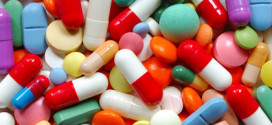You might have heard about some controversy surrounding dietary supplements that contain the compound 1,3-dimethylamylamine (DMAA): such as USP Labs ‘Jack3d’ or Nutrex Research ‘HemoRage Black’. A Warning Letter written by the FDA has been sent to 10 major companies in the supplement industry, including Gaspari Nutrition, USP Labs and Muscle Warfare Inc. The FDA said in the letter that the companies had failed to demonstrate that DMAA was safe and, perhaps more significantly, failed to even prove that DMAA was in fact a dietary supplement. The FDA has given the companies 15 days to answer the organisation’s questions about the ingredient. Amazon, who are a major retailer of products containing DMAA have already stopped selling any products containing the drug.
Patrick Arnold reintroduced DMAA (Methylhexanamine) in 2006 as a dietary supplement, after the final ban of ephedrine as a dietary supplement in the United States in 2005. Arnold introduced it under the trademarked name Geranamine. Other supplement names which have been mentioned as containing methylhexanamine include Jack3d, Oxyelite Pro, Hemo Rage Black, Dexaprine, M5 Extreme, Muscle Meds Code Red, Lipo 6 Black, 1 M.R., DynaPep, Anarchy Covalex, Muscle Spike, Noxipro, Isatori PWR, Muscletech Neurocore, Muscletech Hydroxystim, Fahrenheit Nutrition Lean EFX, Muscle Warfare Napalm, SNI Nitric Blast, BIORhythm SSIN juice, Gaspari Nutrtion Spirodex, MethylHex42, Grenade Universal Grenade, M.A.P. (iovate) Arson, or Geranamine.
All products containing DMAA are marketed as pre workout boosts that give users a pump that could make them “run through walls” or “never stop lifting”. However the drugs pharmacological profile has not been properly evaluated and the stimulant effects on the Central Nervous System are not fully understood. Further to this;
The FDA letters noted that DMAA is known to narrow the blood vessels and arteries, which can elevate blood pressure and may lead to cardiovascular events ranging from shortness of breath and tightening in the chest to heart attack. The agency has received 42 adverse event reports on products containing DMAA. While the complaints do not establish that DMAA was the cause of the incidents, some of the reports have included cardiac disorders, nervous system disorders, psychiatric disorders, and death.
These wouldn’t be the only Dietary Supplements to boast similar effects and the debate as to whether or not DMAA is safe for use as a dietary supplement still burns on. However, the FDA doesn’t have to prove that DMAA is unsafe for consumption. All it has to prove is that DMAA isn’t a dietary supplement, or rather, it can not be defined as a dietary supplement, and therefore, as a drug, would need pre-market approval by the FDA. The DSHEA defines a dietary ingredient as, “a vitamin, mineral, amino acid, herb or other botanical, a dietary substance for use by man to supplement the diet, or a concentrate, metabolite, constituent, extract, or combination of these substances.”
If the companies in question fail to prove that DMAA is indeed a dietary substance, the FDA can immediately begin to order that the sales be halted or start to seize products. Similar happenings have already occurred in Australia and Canada.
You can find studies that dispute the safety and origin of DMAA, claiming that the drug is less potent than amphetamine, yet more potent than Ephedra, a substance that is already banned for use in the UK. Then there are studies that claim to prove DMAA as a safe, dietary supplement: USP Labs DMAAResearch.com is a site dedicated to proving DMAA as just that. However, one should always be weary of a study, website, or indeed any source of information, if the ‘backing’ has a vested interest in the results being one way, or another. In this case, USP Labs stand to continue to make a lot of money from the sales of products containing DMAA, if the drug is classed as safe and proven to be a dietary supplement. Therefore, a website set up by themselves to clear DMAA’s name, should be viewed with a certain scepticism, especially when the landing page contains a typical, “These statements have not been evaluated by the Food and Drug Administration. This product is not intended to diagnose, treat, cure or prevent any disease. Individual results may vary,” disclaimer.
What is true is that products containing DMAA induce symptoms similar to the use of Amphetamines; Panic Attacks, Chest Pain, Cold Sweats, Tingling. Dr. Pieter Cohen, an assistant professor of medicine at Harvard Medical School who specialises in the dangers of dietary supplements has said that: “This pharmaceutical chemical has absolutely no place in the supplement world, We’ve seen six years of inappropriate sales for something that should not have been there in the first place.”
The bottom line is, that whether or not DMAA is deemed to be unsafe or not, products containing it may still be off the shelves sooner rather than later, if the companies in question by the FDA fail to come up with the evidence that proves otherwise. After all, this has already happened with Ephedra.
This also begs the question, why do people need such powerful pre-workout stimulants to push them through a workout? There are already Pre-Workout Supplements that give you the pump needed to get you through a hard workout that don’t contain DMAA, so is it really necessary? Truthfully, this is not for any one person to say, as different people will want different things, and we are always looking for the next best product that will get us the results we want.
The jury is most certainly out on DMAA.
Sam @GBNutrition
 Supplement Judge Unbiased Supplement Reviews – Do they really work??
Supplement Judge Unbiased Supplement Reviews – Do they really work??




